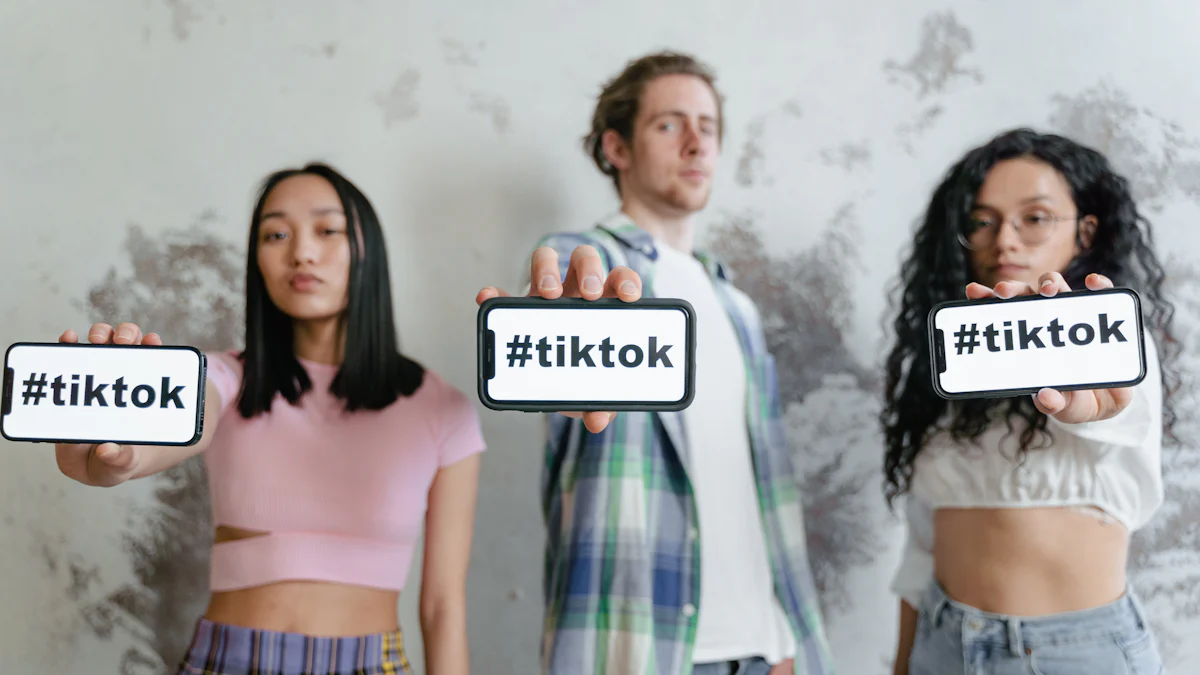How Influencer Culture Shapes Modern Society

Influencer culture has become a defining force in the digital age, significantly impacting influencer marketing society. It shapes how you perceive trends, values, and even yourself. Unlike traditional media, social media allows influencers to connect with you directly, creating a sense of trust and relatability. This connection explains why 61% of people trust influencer endorsements more than celebrity promotions. The power of influencer culture lies in its ability to influence your choices, from what you wear to how you think. Recognizing how much we’re influenced by this phenomenon is crucial for understanding its impact on society and your daily life.
The Rise of Influencer Culture

The Evolution of Social Media Influencers
Social media has transformed how you connect, communicate, and consume content. Platforms like Instagram, YouTube, and TikTok have given rise to a new kind of celebrity: social media influencers. These individuals build large followings by sharing relatable, engaging, or niche content. Unlike traditional celebrities, influencers often feel more approachable. Their authenticity and expertise in specific areas make them highly trusted by their audiences.
In the mid-2000s, platforms such as Facebook and Twitter began gaining popularity. This marked the beginning of influencers establishing their presence online. Over time, these platforms evolved, allowing influencers to create diverse content, from beauty tutorials to gaming streams. Today, influencers dominate the digital space, shaping trends and influencing consumer behavior. Their ability to connect with audiences on a personal level has made them key players in the influencer marketing society.
How Influencer Marketing Shapes Society
Influencer marketing has become a cornerstone of digital marketing campaigns. Brands collaborate with influencers to promote products and services, leveraging their reach and credibility. This strategy has proven effective because you are more likely to trust recommendations from someone you follow and admire. Influencers often integrate products seamlessly into their content, making promotions feel less like advertisements and more like genuine endorsements.
The impact of influencer marketing extends beyond sales. It shapes societal norms and values by promoting specific lifestyles, trends, and ideas. For example, influencers advocating for sustainability or mental health awareness can inspire you to adopt similar practices. However, this influence also comes with challenges, such as the promotion of unrealistic standards or materialistic values. As a result, influencer culture plays a significant role in shaping how you perceive the world around you.
The Democratization of Fame and Influence
One of the most remarkable aspects of influencer culture is its ability to democratize fame. In the past, achieving celebrity status required access to traditional media outlets like television or film. Social media has changed this dynamic, allowing anyone with creativity and determination to gain recognition. You no longer need to rely on gatekeepers to share your voice or talent with the world.
This shift has opened doors for individuals from diverse backgrounds to become influencers. Whether you are a lifestyle blogger, an artist, or an activist, social media provides a platform to showcase your skills and ideas. This democratization has also led to greater representation in the influencer marketing society. Influencers now reflect a broader range of identities, experiences, and perspectives, making the digital space more inclusive and relatable.
However, with this accessibility comes competition. Many young people aspire to become influencers, leading to a saturated market. Success often depends on consistency, originality, and the ability to adapt to changing trends. Despite these challenges, the rise of social media influencers has redefined what it means to be influential in the modern era.
Positive Impacts of Influencer Culture
Cultural Transformation and Representation
Influencer culture has reshaped how you view representation in society. Social media platforms have given voices to individuals from diverse backgrounds, allowing them to share their stories and experiences. This shift has brought greater visibility to underrepresented communities. Influencers who embrace their unique identities inspire you to celebrate your own individuality.
For example, influencers advocating for body positivity or cultural heritage challenge outdated stereotypes. They encourage you to embrace diversity and foster inclusivity. By showcasing different lifestyles, traditions, and perspectives, they help you understand and appreciate the richness of human experiences. This cultural transformation promotes a more accepting and empathetic society.
Educational Value and Knowledge Sharing
Social media influencers have become valuable sources of knowledge. Many influencers specialize in areas like fitness, cooking, technology, or personal finance. They simplify complex topics and present them in engaging ways, making learning accessible to you. Their content often includes tutorials, tips, and step-by-step guides that you can easily follow.
For instance, a fitness influencer might demonstrate effective workout routines, while a tech expert could review the latest gadgets. This practical information empowers you to make informed decisions and develop new skills. According to surveys, relatable personalities are the most appealing to audiences, which explains why influencers excel at educating their followers. Their ability to connect with you on a personal level makes learning enjoyable and impactful.
Economic Growth Through Influencer Marketing
Influencer marketing has become a driving force in the economy. Brands collaborate with influencers to promote products and services, creating opportunities for businesses to reach you directly. This strategy has proven highly effective. A recent survey revealed that 79% of people purchased a product after seeing an influencer use it. This demonstrates the significant role influencers play in shaping consumer behavior.
The economic impact extends beyond sales. Influencers often support small businesses and local artisans by featuring their products. This exposure helps these businesses grow and thrive. Additionally, the rise of influencer culture has created new career paths. Many individuals now earn a living as content creators, contributing to the digital economy. By engaging with influencer-driven campaigns, you actively participate in this evolving marketplace.
Negative Consequences of Influencer Culture
Unrealistic Portrayals and Mental Health Challenges
Influencer culture often promotes idealized lifestyles that can feel unattainable. Many influencers share curated content showcasing picture-perfect moments, flawless appearances, and extravagant experiences. This constant exposure to perfection can lead you to compare yourself to these unrealistic portrayals. Over time, this comparison may lower your self-esteem and create feelings of inadequacy.
The fear of missing out (FOMO) is another issue tied to social media. When influencers post about exclusive events or luxurious vacations, you might feel left out or dissatisfied with your own life. This emotional strain can contribute to mental health challenges, including anxiety and depression. Social media addiction further amplifies these effects, as you may find yourself endlessly scrolling through content that reinforces these negative feelings.
"Social media has revolutionized the way we connect and interact with each other. It has also given rise to a new phenomenon: social media influencers."
While influencers can inspire, their content often sets unrealistic standards. This pressure to emulate their lives can harm your mental well-being, especially if you struggle to meet these expectations.
The Spread of Misinformation and Ethical Concerns
The rise of influencer culture has also brought attention to the misinformation issue. Some influencers, particularly in niches like health and wellness, share advice or promote products without proper research. For example, health influencers may endorse non-evidence-based treatments or debunked methods. This misinformation can mislead you and even pose risks to your health.
The lack of accountability in influencer marketing worsens this problem. Many influencers fail to disclose paid partnerships, making it difficult for you to distinguish genuine recommendations from advertisements. Misleading reviews and false advertising erode trust in influencers as reliable sources of information.
Social media platforms have also become breeding grounds for misinformation campaigns. Influencers with large followings can unintentionally amplify false narratives, spreading them to millions of people. This lack of accountability highlights the need for stricter regulations and transparency in the influencer space.
Cultural Homogenization and Loss of Diversity
Influencer culture often prioritizes trends that appeal to the masses, which can lead to cultural homogenization. As influencers adopt similar styles, aesthetics, and content strategies, unique cultural identities may fade into the background. This loss of diversity can make social media feel repetitive and less representative of the world’s rich variety.
When influencers from different backgrounds conform to mainstream trends, they may unintentionally suppress their own cultural heritage. This shift can discourage you from embracing your individuality, as the content you consume becomes increasingly uniform. Over time, this homogenization may weaken the appreciation for diverse traditions and perspectives.
While influencer culture has democratized fame, it has also created a competitive environment where standing out requires constant adaptation. Many influencers prioritize what gains the most engagement, often at the expense of authenticity. This focus on popularity over originality contributes to the gradual erosion of cultural diversity.
How Influencers Affect Children and Younger Audiences

The Role of Social Media Influencers in Shaping Aspirations
Social media influencers play a significant role in shaping the aspirations of children and teenagers. These influencers often act as modern-day role models, showcasing lifestyles, careers, and values that young audiences admire. Whether it’s a fitness enthusiast promoting healthy habits or a tech creator sharing innovative ideas, influencers inspire children to dream big and pursue similar paths.
However, this influence can be a double-edged sword. While some influencers encourage positive goals, others may promote materialistic or superficial ideals. For instance, children may aspire to achieve fame or wealth without understanding the hard work behind it. A study revealed that 70% of teens trust influencers more than traditional celebrities, which amplifies their impact on a child’s behavior and choices. This trust highlights the need for parents to guide their children in distinguishing between genuine inspiration and unrealistic expectations.
The Impact on Self-Esteem and Mental Health
The curated content shared by social media influencers often portrays an idealized version of life. For children, constant exposure to these seemingly perfect images can create a pressure to fit in. They may compare themselves to influencers’ appearances, achievements, or lifestyles, leading to feelings of inadequacy. Over time, this comparison can harm their self-esteem and mental health.
Social media also fosters a fear of missing out (FOMO). When influencers post about exclusive events or luxurious experiences, children may feel excluded or dissatisfied with their own lives. This emotional strain can result in anxiety or depression. Research shows that teens value social acceptance and dislike social rejection, making them particularly vulnerable to these effects. Parents must remain vigilant and protect their child from falling into the trap of unhealthy comparisons.
On the positive side, some influencers use their platforms to promote mental health awareness. They share personal struggles and coping strategies, helping children feel less alone. These messages can encourage open conversations about mental well-being and provide valuable resources for young audiences.
The Importance of Media Literacy for Younger Generations
Teaching media literacy is essential in helping children navigate the world of social media. With influencers affecting children in profound ways, they need the tools to critically evaluate the content they consume. Media literacy empowers them to question the authenticity of posts, recognize paid promotions, and identify unrealistic portrayals.
Parents and educators play a crucial role in fostering these skills. By discussing the intentions behind influencer content, they can help children understand the difference between genuine advice and marketing tactics. For example, children should learn to spot undisclosed sponsorships or exaggerated claims. This awareness reduces the likelihood of being misled by influencers.
Encouraging children to diversify their online experiences also builds resilience. Exposing them to a variety of perspectives and content types helps them appreciate diversity and avoid cultural homogenization. Media literacy ensures that younger generations grow into informed, critical thinkers who can engage with social media responsibly.
Navigating Influencer Culture Responsibly
Promoting Media Literacy and Critical Thinking
Understanding the content you consume on social media requires media literacy. This skill helps you evaluate the authenticity of posts and identify hidden marketing tactics. Many influencers share curated content that may not reflect reality. By learning to think critically about social media influencers, you can separate genuine advice from promotional material.
To develop media literacy, start by questioning the intent behind the content. Ask yourself if the influencer is sharing personal experiences or promoting a product for financial gain. Look for disclaimers or sponsorship tags that indicate paid partnerships. Recognizing these signs allows you to make informed decisions about what to trust.
Parents and educators play a vital role in teaching younger generations how to navigate social media responsibly. Discussing the impact of influencer culture helps children understand its influence on their perceptions and choices. Encouraging them to diversify their online experiences fosters a broader perspective, reducing the risk of falling into the trap of unrealistic portrayals.
"Media literacy empowers individuals to engage with social media responsibly, fostering a culture of informed and critical thinkers."
By practicing critical thinking, you can enjoy the benefits of social media while avoiding its pitfalls.
Supporting Authentic and Ethical Influencers
Authentic content resonates with audiences because it reflects genuine experiences and values. Supporting influencers who prioritize honesty and transparency helps create a healthier digital environment. These influencers often share relatable stories, promote meaningful causes, and avoid misleading their followers.
To identify ethical influencers, observe their interactions with their audience. Influencers who engage sincerely and address concerns build trust. They disclose sponsorships clearly and avoid promoting harmful or unverified products. By following such individuals, you contribute to a culture that values integrity over profit.
Brands also play a crucial role in promoting authenticity. Collaborating with ethical influencers ensures that marketing campaigns align with moral principles. This approach not only adheres to legal standards but also fosters trust among consumers. When you support brands and influencers who prioritize ethics, you encourage responsible use of social media.
Encouraging Transparency in Influencer Marketing
Transparency in influencer marketing builds trust between influencers and their followers. When influencers disclose paid partnerships, you can distinguish between genuine recommendations and advertisements. This clarity helps you make informed choices about the products and services you consider.
Regulations require influencers to label sponsored content, but ethical considerations go beyond legal compliance. Influencers should strive to maintain honesty in their endorsements, ensuring that their recommendations align with their personal values. This practice enhances their credibility and strengthens their relationship with their audience.
Social media platforms can also contribute by enforcing stricter guidelines for transparency. Clear policies and consistent enforcement ensure that influencers adhere to ethical standards. As a user, you can advocate for these changes by supporting platforms and influencers that prioritize accountability.
"Transparency in influencer marketing fosters a reliable and responsible digital environment, benefiting both creators and consumers."
By encouraging transparency, you help shape a social media landscape that values honesty and trust.
Influencer culture has reshaped society, offering both opportunities and challenges. It fosters cultural transformation, education, and economic growth, yet it also raises concerns about misinformation, unrealistic portrayals, and ethical dilemmas. Understanding this dual impact helps you engage critically with the content you consume. By supporting authentic influencers and promoting transparency, you can contribute to a more responsible digital environment. Both individuals and organizations must prioritize ethical practices to balance the benefits and risks of social media influence. Together, we can shape a culture that values honesty, diversity, and positive societal development.
FAQ
What is influencer culture and how does it impact society?
Influencer culture revolves around individuals, known as influencers, who use social media platforms to share content, build a following, and shape the opinions of their audience. These influencers often focus on topics like lifestyle, fashion, beauty, or fitness. Their ability to connect with followers on a personal level has transformed traditional marketing. Instead of relying on advertisements, brands now use influencers to create authentic endorsements. This shift has not only changed how products are promoted but also influenced societal norms, values, and behaviors.
How does influencer culture affect young people online?
Influencer culture significantly impacts young audiences. Many children and teenagers look up to influencers as role models. They admire their lifestyles, achievements, and appearances. However, much of what influencers share online is curated and edited. This can lead young people to compare themselves to unrealistic portrayals, which may harm their self-esteem. While influencers can inspire positive aspirations, they can also promote unhealthy ideals. Understanding this dynamic helps young people navigate social media more responsibly.
What are the potential downsides of influencer culture?
While influencer culture offers many benefits, it also has drawbacks. It often promotes unrealistic standards of beauty, success, and lifestyle. Constant exposure to such content can lead to feelings of inadequacy or dissatisfaction. Additionally, some influencers spread misinformation, especially in areas like health or wellness, without proper research. The emphasis on consumerism and materialism can also encourage excessive spending. Being aware of these challenges allows you to engage with influencer content more critically.
What is the role of social media influencers in shaping society?
Social media influencers have become powerful figures in shaping societal trends and behaviors. They influence how people perceive fashion, technology, and even social issues. Influencers often use their platforms to discuss topics like mental health, sustainability, or cultural representation. This creates opportunities for positive change. However, their influence also comes with responsibility. When influencers misuse their platforms, they can spread misinformation or reinforce harmful stereotypes. Their role in society highlights the importance of ethical content creation.
How can you identify authentic influencers?
Authentic influencers prioritize honesty and transparency in their content. They openly disclose paid partnerships and avoid promoting products they don’t genuinely support. You can identify them by observing how they interact with their audience. Influencers who engage sincerely and address concerns build trust. They focus on meaningful causes and share relatable experiences. Supporting such influencers encourages a healthier and more ethical digital environment.
Why is media literacy important in the age of influencer culture?
Media literacy equips you with the skills to critically evaluate the content you consume. It helps you recognize curated posts, hidden marketing tactics, and exaggerated claims. By understanding the intentions behind influencer content, you can make informed decisions. Media literacy also empowers younger generations to navigate social media responsibly. Teaching children to question what they see online reduces the risk of falling for unrealistic portrayals or misleading endorsements.
How has influencer culture changed marketing strategies?
Influencer culture has revolutionized marketing. Brands now collaborate with influencers to promote products through personal endorsements. This approach feels more genuine than traditional advertisements. Influencers seamlessly integrate products into their content, making promotions appear natural. This strategy has proven effective, as audiences trust influencers they follow. The rise of influencer marketing has also created opportunities for small businesses to reach wider audiences, contributing to economic growth.
What steps can you take to engage with influencer content responsibly?
To engage responsibly, start by questioning the authenticity of the content. Look for sponsorship disclosures and evaluate whether the recommendations align with your values. Diversify the influencers you follow to gain a broader perspective. Avoid comparing yourself to curated posts, as they rarely reflect reality. Practicing critical thinking ensures that you enjoy the benefits of social media without falling into its pitfalls.
How can parents help children navigate influencer culture?
Parents play a crucial role in guiding children through the world of influencer culture. Open conversations about the realities of social media help children understand that much of what they see online is curated. Teaching media literacy skills enables them to evaluate content critically. Encouraging children to follow diverse influencers fosters an appreciation for different perspectives. By staying involved, parents can help their children develop a healthy relationship with social media.
What is the future of influencer culture?
The future of influencer culture will likely focus on authenticity and transparency. Audiences increasingly value influencers who share genuine experiences and promote ethical practices. Social media platforms may implement stricter guidelines to ensure accountability. As the digital landscape evolves, influencers will continue to shape trends, but their success will depend on their ability to adapt to changing audience expectations. Staying informed about these developments helps you engage with influencer culture thoughtfully.
See Also
Exploring TikTok's Impact on Social Media Evolution
Key Influencer Marketing Trends to Monitor This Year
Defining the Concept of a TikTok Influencer
Explaining TikTok Influencer Marketing and Its Functionality
